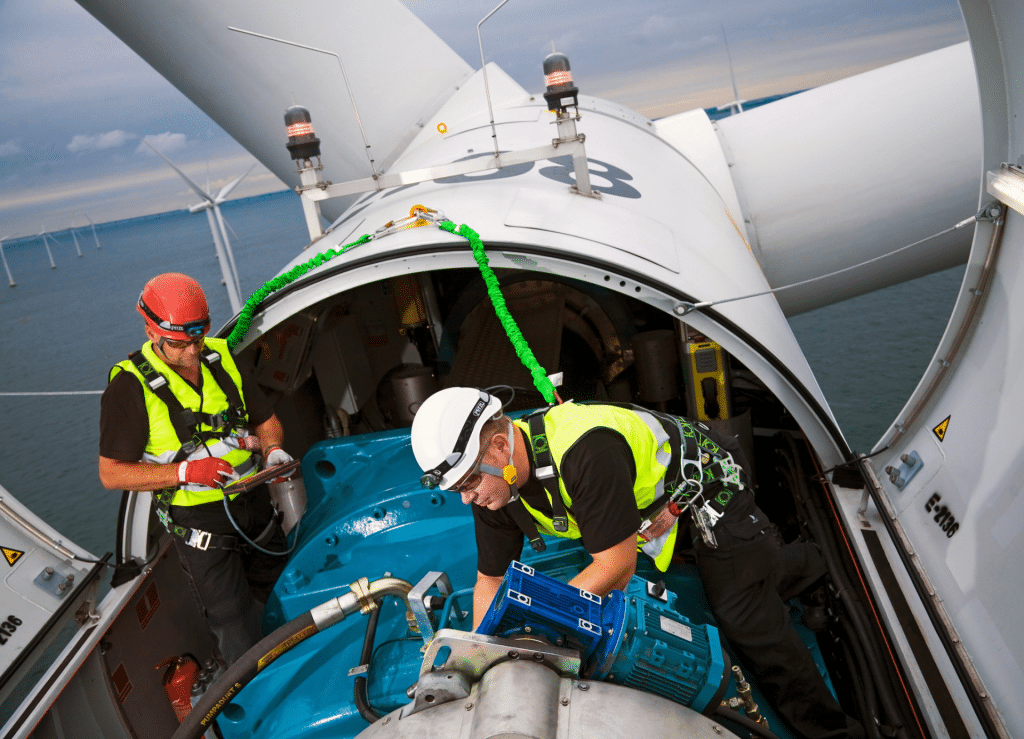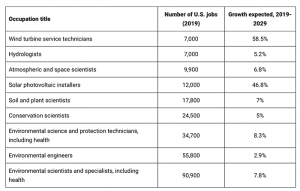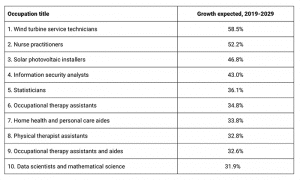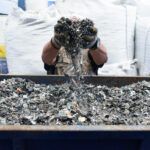What climate change jobs will be in high demand?
By Sara Peach | May 21, 2021
 High up in the air, two engineers work in the nacelle of a Siemens offshore wind turbine on the coast of Europe. Image courtesy of US National Renewable Energy Laboratory
High up in the air, two engineers work in the nacelle of a Siemens offshore wind turbine on the coast of Europe. Image courtesy of US National Renewable Energy Laboratory
Editor’s note: This story was originally published by Yale Climate Connections, an initiative of the Yale Center for Environmental Communication.
Hi Sara,
What kind of careers are going to be in high demand in the future? Climate science? Engineering? Animal conservation? Will we wake up and try to save what’s left of the species on this planet? — Christina F.
Dear Christina,
Oh my, after the year we’ve all had, it feels risky to make predictions. The year 2020 showed us that even well-founded expectations can get scrambled by the metaphorical flap of a butterfly’s wings—or in this case, by a novel virus floating into our nasal passageways.
Take jobs in the solar energy industry. Between 2010 and 2019, employment in that field grew 167 percent, according to the Solar Foundation, a nonprofit educational and research organization. The Solar Energy Industries Association, a trade group, estimated that the industry would employ 302,000 US workers by June 2020. But pandemic-related lockdowns and furloughs resulted in only 188,000 workers employed in jobs supported by the solar industry by that month, 38 percent fewer than anticipated.
Still, as pandemic restrictions ease, emissions of heat-trapping carbon dioxide are rebounding. The problem of climate change is still with us—but so are job opportunities in addressing it.
Growth is expected in a range of climate-related occupations by 2029, according to the US Bureau of Labor Statistics. The bureau developed scenarios to account for uncertainty related to the long-term economic impact of the pandemic. But even under its scenario in which pandemic-induced behavioral changes persist for years, the bureau’s estimates still point to increased demand for workers in the climate field.
Projected growth in select US jobs related to climate change

Marilyn Waite, author of “Sustainability at Work: Careers that Make a Difference,” said in an interview that she expects to see growing demand for a range of jobs related to slowing climate change or helping people adapt to its consequences.
“There will continue to be a lot of work in renewable energy, including the technologies that enable that: energy storage as an example, energy management, energy efficiency,” she said.
Waite expects to see employment in the transportation sector, such as jobs related to the electrification of cars and decarbonization of shipping. In agriculture, she anticipates a range of opportunities, from soil scientists who will be needed to help farmers store more carbon in their soils to communicators who will market climate-friendly foods to the public.
Workers will also be needed to help communities adapt to the consequences of climate change that are already upon us, such as rising seas, intensifying wildfires, and worsening extreme weather. Engineers and builders are already in demand for projects that protect coastal communities from floodwaters.
Climate work for every profession
Demand for wind turbine service technicians will grow faster than any U.S. occupation between now and 2029, according to the Bureau of Labor Statistics. Similarly, despite the slowdown in 2020, solar photovoltaic installers can expect strong job prospects — it’s the third-fastest growing profession.
Top 10 US occupations by expected growth

But if you’re not interested in working with solar panels or wind turbines—or if your career is already established in another field—don’t despair. People in many different occupations can contribute to addressing climate change. Nurses, for example, are educating patients about climate-related health risks and pushing hospitals to reduce energy consumpton.
Composers, artists, and dancers are helping their audiences think more deeply about the problem. Social scientists, city planners, and counselors are also being called upon to help people and communities displaced by sea-level rise, wildfires, and extreme storms.
Office workers, too, can do their part. As Waite writes in her book, “Many of the choices to save water and energy that people make at home can be made at work. Company purchasing departments can also take into consideration the social and environmental impacts of their supply chains.”
Because climate change is a systemic problem, it will take people with all kinds of skills and backgrounds to fight it: writers, scientists, engineers, doctors, lawyers, community organizers, union leaders, teachers, elected officials, farmers, small business owners, chefs, designers, urban planners, architects, and more: a cacophonous crowd of people contributing their talents to the problem. In other words, the ideal career for addressing climate change may be the one you already have.
Got a question about climate change? Send it to [email protected]. Questions may be edited for length and clarity.

Together, we make the world safer.
The Bulletin elevates expert voices above the noise. But as an independent nonprofit organization, our operations depend on the support of readers like you. Help us continue to deliver quality journalism that holds leaders accountable. Your support of our work at any level is important. In return, we promise our coverage will be understandable, influential, vigilant, solution-oriented, and fair-minded. Together we can make a difference.
Keywords: climate change, climate crisis, global warming, jobs, renewable energy, solar, sustainability, wind turbines
Topics: Climate Change















